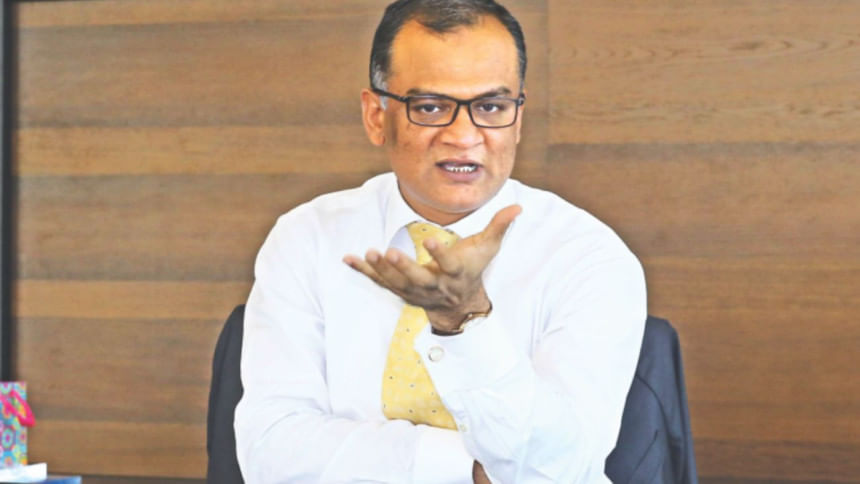Ceramics hold bright prospects

The ceramic tiles industry holds immense growth prospects both at home and abroad as Bangladesh is producing high quality products at competitive prices, said a noted entrepreneur.
Today, locally made ceramic tiles are competitive in terms of cost at global level. The quality is also better than those made in countries such as China.
“We think we are better and we are introducing new technologies every day to achieve global standards,” said Sk Bashir Uddin, managing director of Akij Group.
The group made foray into the ceramic industry only five years ago to tap both the growing domestic and international markets.
Akij Group started with a daily tiles production capacity of 220,000 square feet. Now it makes about 500,000 square feet of tiles daily.
“This was the biggest plant when we started. Today, we are also the biggest plant.”
The company has introduced many new tiles into the market and was the first one to roll out digital printed tiles. Akij Group has also started exporting tiles, albeit irregularly.
“We think that irregular efforts will once be converted into regular exports,” said Bashir.
“What we are trying to do is to have a comprehensive ceramic plant where we will be making tiles, sanitary ware and eventually insulators for electrical transmission lines. Of them, tableware will be largely export-oriented,” he said.
According to Bashir, table wares hold huge export opportunity compared to other products because it is manually processed.
“It is very labour-intensive and anything labour-intensive has an opportunity in Bangladesh,” he added.
“With tiles, sanitary ware and table ware in our basket, we think we will soon become the largest exporter in the ceramic sector in Bangladesh and earn a respectable position within the country,” said Bashir.
One of the reasons behind Akij's entry into the ceramic industry is to create a building material basket from a single source. The group already produces cement and is in process of making steel.
High import tariff protection offered by the government has also encouraged Akij Group to enter the ceramics business and fortify position in the building materials market, which grows 12-15 percent annually.
Currently, the annual market for building materials, which include steel, cement, ceramic and sanitary wares, and plastic pipe, is roughly Tk 45,000 crore. The estimate excludes glass wares, according to Akij Group.
“From various surveys, we have come to know that there will be a boom in the building materials sector in near future,” said Bashir.
Public sector construction is rising in recent times, driving the growth of cement consumption, he said.
The number of households will also increase from 3.2 crore to 4.3 crore by 2025, he said, citing a survey of the Bangladesh Bureau of Statistics. Households are gradually shifting from wooden and corrugated sheets to brick and concrete. By 2025, brick-built houses will account for 24 percent of all households in Bangladesh from 13 percent in 2011.
“So, we foresee a good demand for building materials,” said Bashir.
Son of noted entrepreneur Sk Akij Uddin, Bashir steers Akij Group's more than 20 concerns ranging from jute, textile, particle board, food and beverage, tobacco, plastic, cement and ceramics.
The founder of the group started his entrepreneurial journey with only 17 rupees in capital 75 years ago. Now the group's annual gross turnover stands at $1.5 billion, including $200 million from exports. It employs more than 30,000 people.
Bashir said the primary enablers for the group's success are reinvestment of retained earnings, ensuring financial discipline and having a dedicated human resources base.
“These factors have largely enabled the group to grow,” said Bashir, who wants to create jobs for 100,000 people in the coming days.
He said his father believed that there were two kinds of companies in the world.
“In one type, owners are rich but the companies are poor, while in the other, owners are poor but the companies are rich,” said Bashir.
“From the inception, it has been a zero dividend company and we are maintaining the principle. All the retained earnings are reinvested.”
At Akij Group, shareholders draw a fixed salary like other employees.
“So, Akij is a company where the company is rich but the owners are poor,” said Bashir.
He said the reinvestment of retained profits allows Akij to expand business and employ more people.
“We are in an expansionary mode. Every year we are building something.”
Recently, it set up a flour mill with a daily production capacity of 1,300 tonnes.
Bashir is also upbeat about the country's economy.
He urged the authorities to fix infrastructure bottlenecks, ensure adequate supply of energy, curb corruption and create enabling regulatory environment so that businesses can flourish and create jobs.
He also shared his vision about the group.
“I want to make Akij Group the most respected company in the country. This is where I want to take the company, not necessarily in terms of revenue. I don't want to be the richest man in Bangladesh.”

 For all latest news, follow The Daily Star's Google News channel.
For all latest news, follow The Daily Star's Google News channel. 



Comments